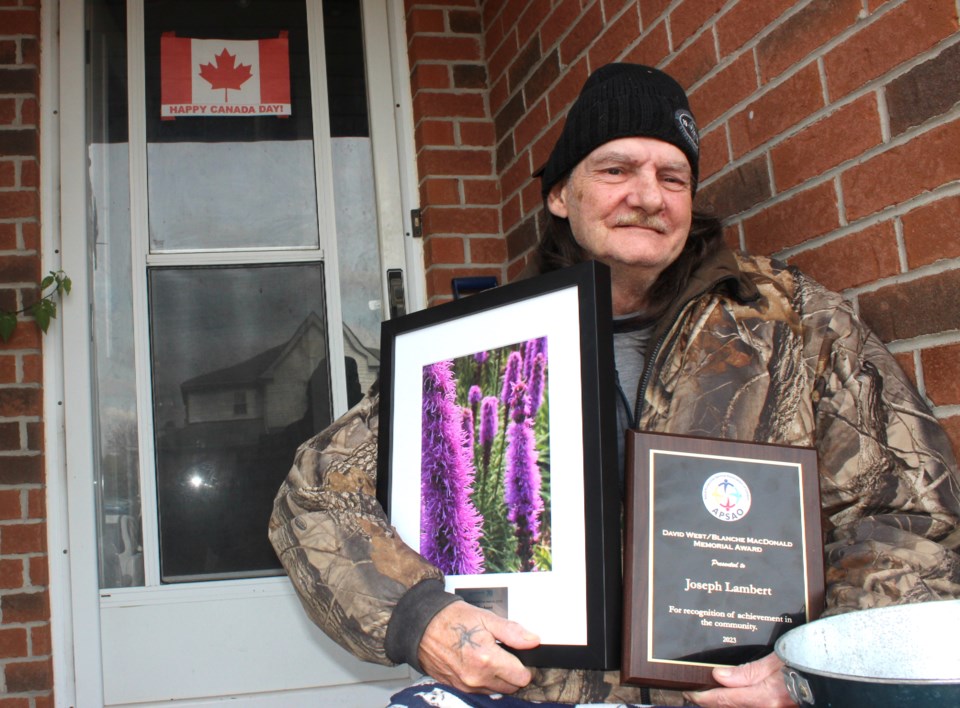Although he can't read and write, Joe Lambert can share a deeply personal story.
The Stratford resident has educated college and university students about his difficult life, which has included his continuing recovery from trauma after living in provincial institutions, including the infamous Huronia Regional Centre.
Sharing experiences about incidents of neglect and abuse have impacted students studying to work in social services fields, some brought to tears to hear first-hand accounts, said Mirjam Schut, who has travelled with Lambert and assists with his presentations at Fanshawe College and Brock University.
"Joe always wanted to teach about institutions, about what he went through" said Schut, lead facilitator af Facile Perth.
Lambert, who lives independently now with his wife of 19 years, Diana, and their dogs Lady, Misty and Scotia (and several cats) said it is difficult telling his story because it brings backs memories and feelings that are difficult to deal with.
But he says it's important that the younger generation of students are aware of what people with developmental challenges may have lived through.
And it is important for their future careers to "know how to respect people and their choices."
Huronia Regional Centre was shut down in 2009, and the provincial government apologized for many years of abuse. A class action lawsuit resulted in payments to survivors.
Lambert spent time in a group home after leaving the institution, but he doesn't agree with that way of living, preferring to have his own choice on where to live and who to live with, or what and when to eat, for example, he said.
During the presentations with students, Schut runs through a slide show. One of the photos shows a beautiful image of Huronia from the outside, which is deceiving, he said. Lambert talks about choices and control.
"You had no control over your life," he said of past experience at institutions.
"Families had no idea what was going on inside," Schut added.
At the end of the presentations, students always ask questions. Professors appreciate the first-person education provided, Schut said.
Students are not the only people taking notice of Lambert's efforts. He is winning some prestigious awards for his efforts.
Megan Watson, a professor in the developmental service worker program at Fanshawe College, said students leave his presentation with a completely different understanding of institutions and survivors.
Watson mentioned his impact in her nomination letter for the Jason Rae award, which he subsequently won.
The award is given to a person with an intellectual disability who has demonstrated leadership and given back to community and presented by Community Living Ontario.
Lambert travelled to Ottawa by himself to accept the award as part of Community Living Ontario's Inspiring Possibilities conference.
Watson said Lambert is a passionate advocate for himself and others. He is kind and considerate and his dedication to educating others so that history does not repeat itself is evident in each presentation. Students leave his presentation with a completely different understanding of institutions and survivors, she said.
Jessica Jantzi, an adult protective service worker with Family Services Perth Huron, nominated Lambert for the David West/Blanche MacDonald award, presented by the Adult Protective Service Association of Ontario (APSAO). The award is given to a person or group of adults who have a developmental disability, for recognition of achievement in their community.
He won that award, too, placing the plaque on the wall near his kitchen table.
Schut and Lambert are also hopeful they can expand their presentations to include secondary schools.
Lambert is carrying on talking about his past, though it remains hard to do so. He is one of 25 people providing survivor stories for an upcoming book project written by a professor at the University of Waterloo. He will also continue on with presentations at post-secondary schools.
"I really believe this is a story the students will remember and take with them when they do their jobs," said Schut.



